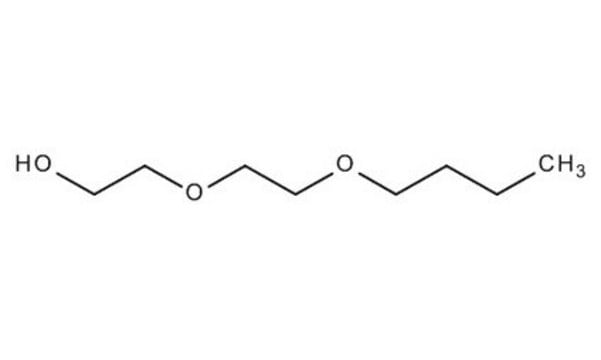32250
Diethylene glycol monobutyl ether
≥98.0% (GC)
Synonym(s):
DEGBE, 2-(2-Butoxyethoxy)ethanol, BDG, Butyldiglycol
Sign Into View Organizational & Contract Pricing
All Photos(1)
About This Item
Linear Formula:
CH3(CH2)3OCH2CH2OCH2CH2OH
CAS Number:
Molecular Weight:
162.23
Beilstein:
1739225
EC Number:
MDL number:
UNSPSC Code:
12352100
PubChem Substance ID:
NACRES:
NA.22
Recommended Products
Quality Level
Assay
≥98.0% (GC)
form
liquid
impurities
≤0.05% water
refractive index
n20/D 1.432
pH
7
bp
224-228 °C (lit.)
density
0.953 g/mL at 20 °C (lit.)
SMILES string
CCCCOCCOCCO
InChI
1S/C8H18O3/c1-2-3-5-10-7-8-11-6-4-9/h9H,2-8H2,1H3
InChI key
OAYXUHPQHDHDDZ-UHFFFAOYSA-N
Looking for similar products? Visit Product Comparison Guide
Application
Diethylene glycol monobutyl ether (DEGBE) is used:
- In the preparation of blocked isocyanate systems for coil coating, electro-coating and powder coating.
- As a cosurfactant in the formation of microemulsions.
- As a structural component of various liquid crystals.
Signal Word
Warning
Hazard Statements
Precautionary Statements
Hazard Classifications
Eye Irrit. 2
Storage Class Code
10 - Combustible liquids
WGK
WGK 1
Flash Point(F)
210.2 °F - closed cup
Flash Point(C)
99 °C - closed cup
Personal Protective Equipment
dust mask type N95 (US), Eyeshields, Gloves
Choose from one of the most recent versions:
Already Own This Product?
Find documentation for the products that you have recently purchased in the Document Library.
Customers Also Viewed
Sebastian Abegg et al.
Nanomaterials (Basel, Switzerland), 10(6) (2020-06-21)
Nitrogen dioxide (NO2) is a major air pollutant resulting in respiratory problems, from wheezing, coughing, to even asthma. Low-cost sensors based on WO3 nanoparticles are promising due to their distinct selectivity to detect NO2 at the ppb level. Here, we
Doping molecular semiconductors: n-type doping of a liquid crystal perylene diimide.
Gregg BA and Cormier RA
Journal of the American Chemical Society, 123(32), 7959-7960 (2001)
Synthesis and characterization of diethylene glycol monobutyl ether?Blocked diisocyanate crosslinkers.
Ranjbar Z, et al.
Progress in Organic Coatings, 69(4), 426-431 (2010)
Microemulsion systems with monobutyl ether of ethylene glycol or diethylene glycol as cosurfactant.
Chew CH, et al.
Journal of Dispersion Science and Technology, 9(1), 17-31 (1988)
Yeomin Yoon et al.
Journal of membrane science, 261(1-2), 76-86 (2005-09-02)
Rejection characteristics of organic and inorganic compounds were examined for six reverse osmosis (RO) membranes and two nanofiltration (NF) membranes that are commercially available. A batch stirred-cell was employed to determine the membrane flux and the solute rejection for solutions
Our team of scientists has experience in all areas of research including Life Science, Material Science, Chemical Synthesis, Chromatography, Analytical and many others.
Contact Technical Service










